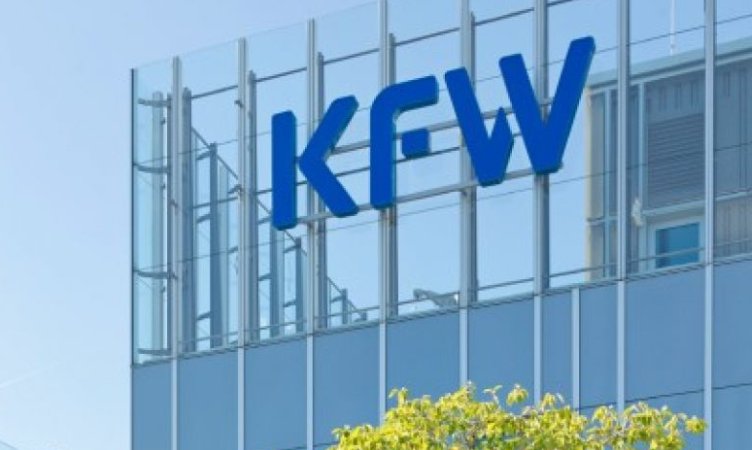Strategically implementing sustainability

Sustainable activities affect all banks and thus also KfW’s business areas. In 2018 KfW stepped up efforts in sustainability management by integrating it into the corporate strategy department – thereby giving it high priority.
As a promotional bank acting on behalf of the German Federal Government and its federal states, KfW Group bears a special responsibility for improving economic, social and environmental living conditions. To this end, our work focuses on three aspects: we assess the promotional impact of our financing, ensure that our bank operations manage resources efficiently and strengthen our role as a responsible employer. To ensure alignment with our business strategy department, KfW’s sustainability management has been integrated into the corporate strategy since autumn 2018. In organisational terms, overall responsibility lies with the newly created position of the Group Officer for Sustainability, which was assumed by the CEO Dr Günther Bräunig.
Roadmap Sustainable Finance
KfW wants to embed sustainability more firmly in all business areas. In mid-2018, the KfW Executive Board adopted the KfW Roadmap Sustainable Finance to this end, with the aim of creating a stringent, multi-dimensional sustainability concept by 2020. Involving a range of central units and all areas of the market, work on the roadmap has been divided into five sub-projects.
Actively shaping change
Three questions for Jürgen Kern, Director of Corporate Strategy and Sustainability:

Be it climate change, social transformation or digitisation: the challenges facing KfW are great and often involve disruptive changes. How does the corporate strategy address this challenge?
It goes without saying that we at KfW have also noticed that general conditions and technologies are changing rapidly and that the demands placed on us are also changing as a result. Digitisation affects not only our customers’ business models, but also what they expect from us. To meet these requirements, we are expanding our range of digital services, for example. The start-up platform that we initiated together with the Federal Ministry for Economic Affairs and Energy is one example of this. The online platform offers customised and easily accessible advice and support for start-ups.
Internally, we respond to changing overall conditions with agile work methods that are increasingly project-oriented on the basis of scrum or design thinking. This allows us to respond or adjust to sudden changes. We thus adapt the way we work to the volatile environment. But this doesn’t affect the focus of the content of our promotional business: megatrends like climate change and the environment, globalisation, social change, digitisation and innovation, which are embedded in the strategic objectives, remain highly relevant despite changing overall conditions and form the guiding principles behind our actions.
In autumn 2018 KfW Group integrated sustainability management into the strategy department. What was the reason for the reorganisation?
It is our mission to promote social, environmental and economic living conditions around the world. The three dimensions of the concept of sustainability are thus already an integral part of our core business. Consequently, we have now also integrated sustainability management into our corporate strategy in organisational terms. Our CEO Dr Günther Bräunig is responsible for the newly created position of Group Officer for Sustainability. We are thus bolstering the issue by creating an even more direct reporting line. By including sustainability ratings in our strategic objectives, we also make it possible for our performance to be assessed independently from the outside, which we also see as an impetus for our strategic further development.
One focus of the content of the Roadmap Sustainable Finance is a new financing steering concept to be developed by 2020. This will systematically integrate SDGs and CO2 footprints. Why was this step taken?
With the Roadmap Sustainable Finance, we are promoting sustainability throughout the Group with the help of various sub-projects. One key element is the development of a new steering concept for our business. The Sustainable Development Goals (SDGs) and CO2 footprints mentioned in your question are just two of many conceivable tools that we are currently reviewing systematically for their steering effect. The goal is to improve the impact of our promotional projects on the SDGs and the Paris Climate Agreement. This is a major challenge. For example, it is relatively easy to calculate the CO2 emissions savings of a project – such as a wind farm – but it is more difficult to include the footprint of the entire value chain, i.e. emissions from production to disposal. In order to establish a methodology that is both sound and practical, we collaborate with rating agencies, research institutes and other banks.
Sustainability doesn’t just comprise mitigating climate change
However, sustainability does not just include climate change mitigation, even though around 40% of our promotional business volume is currently invested in measures designed to mitigate climate change and protect the environment. As a promotional bank, we cannot ignore the social and economic aspects of our mission. One example of this is the Baukindergeld grant introduced in 2018: this subsidised purchase of owner-occupied residential property for families with children has been very well received. It is an important tool for affordable housing and for preventing social inequalities from growing. This is just as important for the long-term cohesion of our society as climate change mitigation.
















